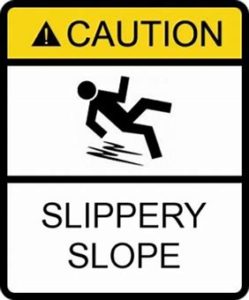Job titles can be a slippery slope. In a previous blog, I discussed how employers can be stingy with the job title for a position, especially when it might mean having to pay the employee more based on additional responsibility.

Similarly, job titles can be a slippery slope on resumes.
Putting All of Your Experience Under One Position Title
More often than not, I will be working with a client and they mention that they had held multiple positions at one company.
However, their resume only reflects one job encompassing multiple years.
Upon further questions, it is clear that they have taken their job titles onto a slippery slope.
If a prospective employer were to call the previous company, it would be discovered that the candidate was NOT in the higher-level position(s) for the duration of their employment there.
In a way, it’s deceiving to try and make it sound that all the time that was spent at an employer was in a higher-functioning title / position when in fact, there was a progression to getting there.
Job titles can be a slippery slope because you ALWAYS need to show the progression. And here’s why:
By showing career advancement at a company, it demonstrates that you were a valued asset and therefore promoted or reassigned to a new area to apply your career expertise.
It actually HELPS you to show progression on your resume, rather than trying to lump the entirety of your job experience at that employer under one job title.
The easiest employment check to do is to verify dates of employment and job titles.
So why try to claim more time in the higher-level position when in fact that’s false, AND by clearly articulating promotions, you come across as a BETTER employee who has been valued?
Dangers of Up-Titling
Another problem I see is that people will, after a certain amount of time and distance has separated them from previous employment, will adopt what they feel to be a better job title than the one they ad.
Similar to employers who won’t provide accurate job titles, some people decide to revamp their career based on what they felt was the true job title.
Here’s where job titles can be a slippery slope from the candidate side.
Again, employment checks are the easiest ones to conduct, so if you aren’t accurately reflecting the job title which is on file in the human resource department, you could get into trouble.
My advice is to do this:
State the actual job title you held, then, in parenthesis, include “equivalent to” and add the more accurate job title.
That way, you are providing the truthful answer, while also equating your level of work to what translates best to your job target.
But remember, you always need to be able to substantiate that claim in your workplace accomplishments.
Show how you performed at that level and the wins you achieved at that level.
These tips can help you navigate what to do when job titles can become a slippery slope on your resume.
